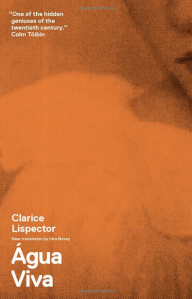Clarice Lispector
Translated by Stefan Tobler
88 pages
New Directions Books
Although Água Viva is officially classified as fiction, it is likely to appeal more to those with a taste for poetry than to those who prefer the more familiar manifestations of prose. Água Viva lacks narrative structure: in fact, one reviewer described it as “non-narrative fiction” — whatever that means. For the most part the author betrays even her own basic construct, which is that this work has been written by an unnamed narrator — a painter who is exploring the artistic possibilities of the writing medium for the first time — to a lover from whom she has been temporarily and unwillingly parted.
Despite the wrench she claims to feel at his departure, the “other” to whom the writing is ostensibly addressed is not important to this work. For most of Água Viva, the narrator seems to be speaking only to herself, and when she does speak of the one who is away, it is not to provide us with any information about that person or his relationship to her, nor even to engage with him in any concrete way, but only to more fully explore the meanderings of her own thought processes. I often found myself thinking that the work would have succeeded equally well as an interior dialogue. The narrator seems to agree: late in the book, she says, “We will meet this afternoon. And I won’t even talk to you about this that I’m writing and which contains what I am and which I give you as a present though you won’t read it. You will never read what I’m writing. And when I note down my secret of being—I shall throw it away as if into the sea.”
But when read as a series of meditations, or linked poems, rather than than as any kind of coherent conversation, Água Viva is frequently stunning, often lovely and nearly always stimulating. (Like most internal dialogues, it is also occasionally boring.) It contains meditations on many subjects, among them flowers, music, days of the week, God, sleep and mirrors (“a tiny piece of the mirror is always the whole mirror”). It is a meditation on writing (“So writing is the method of using the word as bait: the word fishing for whatever is not word. When this non-word — between the lines — takes the bait, something has been written”).
But primarily it is a meditation on time. Lispector’s narrator says, “I want to grab hold of the is of the thing…. I want to possess the atoms of time. And to capture the present, forbidden by its very nature: the present slips away and the instant too, I am this very second forever in the now.” And then, “Is my theme the instant? the theme of my life.” Observations and ruminations such as these cause the reader to stop, sometimes with a sharp intake of breath, to admire and re-read. Lispector is intelligent, insightful, and a brilliant wordsmith. (“Then I live the blue daybreak that comes with its bulge full of little birds.”) She is a poet.
Clarice Lispector, who wrote in Portuguese and has been been by turns acclaimed as one of the most important Jewish writers and one of the most important Brazilian writers, can be frighteningly dark. Some passages are so infused with nightmarish imagery that they seem suited to musical treatment by Diamonda Galás:
The liturgy of the dissonant swarms of the insects that emerge from the foggy and pestilential swamps. Insects, frogs, lice, flies, fleas and bedbugs – all born of the corrupted diseased germination of larvae. And my hunger is fed by these putrefying beings in decomposition.
Lispector was born in a Ukrainian shtetl in 1920. Her family fled soon after to Brazil to escape the atrocities to which Jews in Ukraine were subjected following the first world war. Her mother, paralyzed, had been raped in the pogroms, and died when Clarice was nine.
Given the appalling events that marked her early life, the miracle of this book is not its darkness, but its joy. The work opens with hallelujahs and concludes with the narrator’s determined resolution to be joyful (“Because it’s too cruel to know that life is just one time and that we have no guarantee outside our faith in shadows – because it’s too cruel, so I respond with the purity of an untamable happiness”).
The narrative curve of Água Viva not is not described by plot, but by emotion. It begins on a peak, with the kind of elation that can sometimes be torn from parting, then wends its way down and around the inside of a self through the darkness, chaos, and questions that one can experience only in solitude, to emerge with the narrator’s hard-won but powerful decision to live, to love and – most of all – to be happy.
“I am ferociously alive – and I lick my snout like a tiger who has just devoured a deer.”
In Lispector’s prose, as in good poetry, those readers who are willing to work for it will find elation, despair, kindred-spirit-hood – and maybe even anthems.



Mary W. Walters
/ January 22, 2015Reblogged this on The Militant Writer.
LikeLike